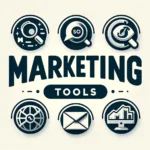
Digital Marketing Tools: Transforming Online Engagement
The Importance of Marketing Tools
In today’s digital landscape, businesses face a multifaceted challenge – to not only establish an online presence but also to engage effectively with their target audience. To address this challenge, it’s imperative to recognize the importance of marketing tools designed to enhance your online engagement strategies.
Types of Marketing Tools
| Tool | Purpose | Functions |
|---|---|---|
| SEO Tools | Enhance search engine visibility | Keyword optimization |
| Social Media Management | Simplify social media handling | Post scheduling, analytics |
| Email Marketing Software | Streamline email campaigns | Segmenting, personalization |
| Analytics Tools | Provide insights on digital performance | Traffic and behavior analysis |
1. Search Engine Optimization (SEO) Tools
Search engines are the gateway to the digital world, and SEO tools are your trusty guides in this realm. These tools enable you to optimize your website’s content, structure, and keywords to rank higher in search engine results. For instance, when your website appears prominently in search results, you’re more likely to attract organic traffic, ultimately increasing your online visibility. View tools like Neuronwriter for SEO Optimization.
We like to mention that we are affiliates of Neuronwriter, so any programs bought through our website gives us a commission! However, we always make sure that the products and services we recommend are of high quality and reviews!
2. Social Media Management Platforms
Social media has become a powerhouse for marketing, but managing multiple platforms efficiently can be a daunting task. Management platforms made to simplify this process are vital tools in social media management. They allow you to schedule posts, analyze engagement metrics, and monitor your brand’s presence across various social networks. By leveraging these tools, you can maintain a consistent online presence and foster meaningful connections with your audience. Some examples include Hootsuite and and Zoho Suite!

3. Email Marketing Software
Email remains a potent tool for direct communication with your audience. Software curated for email marketing streamlines the process of creating, sending, and tracking email campaigns. It enables you to segment your email list, personalize content, and measure the success of your campaigns. With the right email marketing tools, you can nurture leads, retain customers, and drive conversions effectively. Software companies include Constant Contact and AWeber!
4. Analytics Tools
Data is the lifeblood of digital marketing, and analytics tools are your means to tap into this resource. They provide insights into website traffic, user behavior, and campaign performance. By analyzing these data points, you can make informed decisions, refine your strategies, and optimize your online engagement efforts for better results.
Understanding the role and capabilities of these marketing tools is pivotal for businesses aiming to thrive in the digital age. Moreover, each tool serves a specific function, and when integrated strategically, they form a potent arsenal that can transform your online engagement efforts from ordinary to extraordinary.
By incorporating SEO strategies, maintaining an active presence on social media, leveraging email marketing campaigns, and harnessing the power of data-driven insights, businesses can establish a strong digital foothold and drive engagement like never before.
Demonstrating the Vital Importance of Marketing Tools in Audience Engagement
In the world of digital marketing, talk is cheap. To truly understand the vital importance of marketing tools, we need to examine hypothetical examples based on real life success that showcase their transformative potential in boosting audience engagement.
| Case Study | Focus Area | Outcome |
|---|---|---|
| The SEO Revolution | Local SEO for a bakery | Higher search ranking, increased traffic |
| Social Media Success | Fashion brand on social media | Growing follower count, enhanced brand loyalty |
| Email Marketing Mastery | Personalized email campaigns | Higher engagement, boosted sales |
| Data-Driven Decision-Making | Website analytics for tech startup | Improved conversion rates, revenue growth |
Case Study 1: The SEO Revolution
Imagine a small local bakery struggling to make a mark in the digital space. By implementing SEO tools and strategies, they optimized their website with local keywords and improved their online visibility. As a result, their website started appearing on the first page of search engine results for queries like “best pastries in Nashville.” This simple yet effective use of SEO tools led to a significant increase in website traffic, attracting more customers to their shop.
Case Study 2: Social Media Success
A startup fashion brand leveraged social media management platforms to streamline their social media efforts. By scheduling posts, analyzing engagement data, and responding promptly to customer inquiries, they maintained an active and engaging online presence. Over time, their follower count grew, and they cultivated a loyal community of fashion enthusiasts, leading to increased sales and brand loyalty.
Case Study 3: Email Marketing Mastery
An e-commerce giant harnessed the power of email marketing software to personalize their email campaigns. By segmenting their customer base and sending tailored product recommendations, they achieved higher open and click-through rates. This personalized approach not only boosted sales but also improved customer satisfaction and retention.
Case Study 4: Data-Driven Decision-Making
A tech startup relied heavily on analytics tools to refine their digital marketing strategy. By closely monitoring website analytics, they identified the pages that were driving the most conversions and optimized those for better performance. As a result, their conversion rate increased by 30%, leading to substantial revenue growth.

These examples, although hypothetical, demonstrate the tangible benefits of marketing tools in driving audience engagement. Whether it’s through improved search visibility, a stronger social media presence, personalized communication, or data-driven decision-making, marketing tools empower businesses to connect with their audience effectively and achieve remarkable results.
By highlighting these success stories, we aim to underscore the vital importance of marketing tools in today’s digital landscape. They are not just tools; they are the catalysts that can transform your online engagement strategies and drive your business towards success.
Now that we’ve witnessed the compelling impact of marketing tools, it’s time to unravel the art of integrating these tools for maximum effect. A well-coordinated and unified approach is the key to unlocking their full potential and achieving remarkable results in your online engagement strategies.
Marketing Tool Strategies
Strategy 1: Holistic Marketing Integration
In the digital landscape, the importance of marketing tools must ensure that no marketing tool operates in isolation. Your website, social media platforms, email campaigns, and analytics should work harmoniously towards a common goal. By aligning your marketing efforts across these channels, you can ensure a consistent brand image and messaging, which resonates with your audience.
Strategy 2: Data Synergy
Data is the lifeblood of digital marketing, and it flows through each of your marketing tools. Integrate your analytics tools with other platforms to gain deeper insights into customer behavior. For instance, combining website analytics with email marketing data can help you tailor your campaigns to specific customer segments more effectively.
Strategy 3: Automation for Efficiency
Marketing tools often come with automation capabilities. Embrace these features to streamline repetitive tasks and ensure timely and personalized communication with your audience. Automation can free up valuable time for your team to focus on crafting engaging content and devising strategic campaigns.
Strategy 4: Continuous Optimization
The digital landscape is ever-evolving, and so should be your marketing strategies. Regularly assess the performance of your marketing tools and strategies. Use A/B testing to refine your email campaigns, tweak your SEO strategies to adapt to changing search algorithms, and analyze social media engagement metrics to fine-tune your content strategy.
Strategy 5: Unified Reporting

To measure the overall impact of your marketing efforts, consolidate data from various tools into unified reports. This holistic view allows you to assess the effectiveness of your campaigns comprehensively and make data-driven decisions to optimize your online engagement strategies further.
For small businesses and startups, these integration strategies are particularly valuable. Limited resources and budgets necessitate a more efficient and cohesive approach. By implementing these strategies, you can make the most of your marketing tools and compete effectively in the digital arena.
The Importance of a Marketing Tools for an Unified Digital Marketing Strategy
We’ve explored their marketing tool significance and their potential when integrated. Now, let’s emphasize the pivotal role of a unified digital marketing strategy in harnessing the collective power of these tools.
Why a Unified Strategy Matters for Marketing Tools
- Consistency: A unified strategy ensures that your brand maintains a consistent voice and image across all digital channels. When customers encounter a cohesive message, it reinforces brand trust and recognition.
- Efficiency: Coordinating your marketing efforts through a single strategy optimizes resource allocation. You can avoid redundancy, streamline workflows, and eliminate conflicting messaging.
- Targeted Engagement: By centralizing your strategy, you gain a better understanding of your audience’s behavior and preferences. This knowledge allows you to tailor your campaigns for more effective and personalized engagement.
- Data Insights: A unified approach makes it easier to gather and analyze data from various marketing tools. You can draw valuable insights across channels and use them to make informed decisions.
Building a Marketing Tool Unified Strategy
| Component | Description |
|---|---|
| Set Clear Objectives | Define specific business goals for digital marketing and align them with overall business strategy. |
| Audience Segmentation | Segment the target audience by demographics, behaviors, and preferences, and tailor content for each group. |
| Content Strategy | Create a consistent content plan across website, social media, and email that aligns with objectives and resonates with the audience. |
| Integrated Campaigns | Plan multi-channel campaigns, like combining social media promotions with email follow-ups, for greater reach and impact. |
| Data and Analytics | Use analytics to track campaign performance and gain insights for strategy refinement. |
| Regular Review | Continuously review and adapt the strategy to align with changing business goals and market conditions. |
By focusing on a unified digital marketing strategy, you can effectively leverage the importance of marketing tools to achieve your business objectives. This strategic cohesion allows you to engage your audience more effectively, make data-driven decisions, and ultimately drive growth in the digital age.
The Future of Digital Marketing Tools
As we journey through the digital landscape, it’s essential to keep an eye on the horizon. The world of digital marketing tools is in a constant state of evolution, with emerging trends and technologies poised to reshape online engagement. Let’s peer into the future and explore what lies ahead in this ever-evolving realm.
1. Artificial Intelligence (AI) and Machine Learning:
AI and machine learning are becoming integral components of digital marketing. These technologies empower businesses to analyze vast amounts of data, automate tasks, and personalize interactions with customers. AI-driven chatbots, predictive analytics, and recommendation engines are just a glimpse of what’s possible. In the future, AI will continue to enhance customer experiences and streamline marketing processes. Check out AI software like ChatGPT for further insight!
2. Augmented Reality (AR) and Virtual Reality (VR):
AR and VR are opening up new avenues for immersive marketing experiences. From virtual showrooms to interactive product demonstrations, these technologies allow businesses to engage customers in novel ways. As AR and VR become more accessible, marketers will find innovative ways to leverage them for brand storytelling and customer engagement.
3. Voice Search Optimization:
With the growing popularity of voice-activated devices like smart speakers, optimizing for voice search is becoming crucial. Marketers will need to adapt their SEO strategies to accommodate natural language queries and conversational search. Voice commerce and voice-based content are also areas poised for growth.
4. Video Marketing Evolution:
Video marketing will continue to dominate as consumers favor visual content. Live streaming, 360-degree videos, and interactive video experiences will become more prevalent. Additionally, personalized video content, tailored to individual viewer preferences, will enhance engagement.
5. Privacy and Data Protection:
As concerns over data privacy and security persist, marketers will need to navigate a landscape of stricter regulations and consumer expectations. Building trust through transparent data practices and ethical marketing will be paramount.
6. Cross-Platform Integration:
The importance of seamless integration across various digital platforms will only intensify. Marketers will need to find ways to harmonize their messaging and strategies across websites, social media, email, and emerging channels.
Preparing for the Future

To thrive in this dynamic landscape, businesses must remain adaptable and forward-thinking. Stay informed about emerging trends, invest in staff training, and be open to experimentation. Embrace new technologies and strategies that align with your audience’s evolving preferences.
In conclusion, the future of digital marketing tools holds exciting possibilities. By staying ahead of the curve and embracing these advancements, businesses can continue to transform online engagement and connect with their audiences in meaningful and impactful ways.
As we wrap up our exploration of the importance of marketing tools in the digital era, remember that success lies in not just adopting these tools but in how creatively and effectively you use them. Embrace the changes, adapt to evolving customer behaviors, and let innovation drive your digital marketing journey. The possibilities are limitless, and the journey is ever thrilling.
FAQs
Marketing tools help small businesses maximize their limited resources by efficiently targeting and engaging their audience, tracking results, and optimizing their strategies based on data-driven insights.
Absolutely. These tools offer personalized communication strategies, such as tailored email campaigns and social media interactions, leading to improved customer engagement and retention.
Analytics tools provide valuable insights into consumer behavior, campaign performance, and ROI, enabling businesses to make informed decisions and adjust strategies for better outcomes.
ROI can be measured through various metrics provided by these tools, such as conversion rates, customer acquisition costs, and overall campaign performance. Aligning these metrics with business objectives provides a clear picture of the return on investment.
Read More
Trying to figure out if digital marketing is for you? Check our our Digital Marketing Bootcamp Analysis!
For more insights check out our review on content writers like Neuronwriter!
- Digital Marketing Tools: The Importance of Marketing Tools
 The Importance of Marketing Tools In today’s digital landscape, businesses …
The Importance of Marketing Tools In today’s digital landscape, businesses …Digital Marketing Tools: The Importance of Marketing Tools Read More »
- A Guide to Fundamental Marketing Tools for Businesses
 What are marketing tools? At Opvital, we’re dedicated to shedding …
What are marketing tools? At Opvital, we’re dedicated to shedding …A Guide to Fundamental Marketing Tools for Businesses Read More »
- The Significance of Marketing Tools
 Key Takeaways for Marketing Tools Marketing Tools Overview – Diverse …
Key Takeaways for Marketing Tools Marketing Tools Overview – Diverse … - A Comprehensive NeuronWriter Review: Unveiling Its SEO Powers
 Welcome to Opvital’s in depth NeuronWriter Review. NeuronWriter is more …
Welcome to Opvital’s in depth NeuronWriter Review. NeuronWriter is more …A Comprehensive NeuronWriter Review: Unveiling Its SEO Powers Read More »
